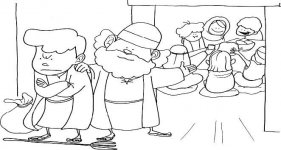THE PARABLES | The Prodigal Son (Luke 15:11-32)
THE PARABLES | The Prodigal Son (Luke 15:11-32)
So, he got up and went to his father. But while he was still some distance [from the house], his father saw him and felt deep pity [for him], so ran and embraced him and kissed him [enthusiastically].
Luke 15:20, An Understandable Version
Luke 15:20, An Understandable Version
Context: The parable of the two lost sons represent two reactions to Jesus. One, away in a distant country, was the rule-breaker, the immoral person - with his sins of the flesh. The other, staying in the field, was the rule-maker, the moral person - with his sins of the spirit. Both sons had a slave-master relationship with their father.

Meaning: Who is represented by the father? In context, it is the one who “welcomes sinners” (vs 2), the shepherd of lost sheep (vs 4-7) - Jesus himself, reflecting the characteristics of God. Both sons were happy to receive their father’s things but avoided a relationship with him. The prodigal son returned with the beginnings of an apology reminiscent of Pharaoh’s words, “I have sinned against the Lord your God and against you” (Exod 10:16). Whatever his motives, his father still viewed him as a loved son, showering him with love, despite the Torah calling for a disobedient son’s death, by a shower of stones! (Deut 21:18-21) The older son was also lost but in his self-righteousness.
Application: Have we ever wanted freedom from God’s ways, like the younger son? Or craved more respect, pointing to our good performances with a whiff of moral superiority and a judgmental spirit? Is our relationship with God more of a slave-master rather than a son-father relationship? The older brother, aka the Pharisees, eventually in fury killed Jesus who represented our Father. Jesus, robe stripped from him, sandals removed from his nail-pierced feet, became our sacrifice outstripping any fattened calf.
____________________________
Real life and liberation are found at home, in the father’s arms.
Real life and liberation are found at home, in the father’s arms.
